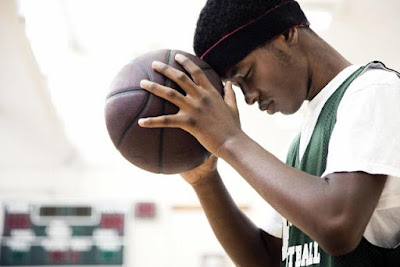As a sport psychologist I work with athletes to play their best on the field (court, etc.) The fact is that doing well in the classroom – and on exams – is just a different kind of performance, and in many ways, the same strategies and concepts that are useful in sports are similarly helpful in the classroom. Here are some thoughts that will hopefully be useful to you in maximizing your success in exams. Good luck!!
1. SUSTAINING YOUR FOCUS
Focus is a key factor in effective studying and in test taking. When it comes to studying, it is pretty difficult to maintain quality focus over extended periods of time. Most experts recommend dividing your study time into 20-30 minute bouts. During those periods expect of yourself to be highly focused. You might set your watch for the 20 or 30 minutes. Then take a 3-5 minute break to de-stress and re-group. Take a few slow, deep breaths. Check where there is stress in your body (shoulders? back? forehead?) and engage in some sort of relaxation strategy to rid yourself of that stress. You might take a brief walk or otherwise look for a change of setting during those 3-5 minutes. The more relaxed you are when you return to the task of studying the more focused you will be – and the more efficient your studying will be in terms of comprehension and retention of the material.
Another thing to bear in mind is that just as you wouldn’t go into the weight room and try to do all your week’s work in one afternoon, it is similarly more effective to master the material in smaller, repeated sessions than in one extended session. After an hour or so of studying one subject, you are probably well advised to shift gears and go to another subject (think of it like cross-training).
2. VISUALIZATION
Before you sit down to study, spend 2-3 minutes visualizing yourself in the times you have been most focused, and visualize yourself being similarly focused as you go to the work at hand. See yourself being efficient and understanding the material. Even if you don’t exactly understand it altogether, having a positive mind frame should definitely help.
There is research that highly confident athletes make use of visualization picturing themselves achieving their goals on a more regular basis than other athletes. If you have trouble seeing yourself being focused for study or test-taking, then recall in your mind a time when you were focused, so that you can transfer the feeling of being focused to the task at hand.
3. DE-STRESSING
Remember, stress is not the enemy. Without some measure of stress we would not push ourselves – whether on the playing field or in the classroom. Champions and top performers expect to experience stress, but they are also good at remembering to de-stress at regular intervals throughout the day in order to maintain a manageable level of stress rather than let it become overwhelming. Do you have successful de-stressing strategies (which don’t involve food or drink!!)? In general, taking some slow, deep breaths, taking a few moments to relax in areas where you may be tense (such as the back of your neck, shoulders, forehead, etc.) or picturing yourself in a relaxing setting such as the beach can help you to de-stress.
4. CONFIDENCE
You know how important confidence is in sport performance. It is similarly helpful to be confident in studying and taking exams. Recall past successes in both studying/mastering material. If you find yourself saying things like “I NEVER…” (such as “I NEVER do well in exams), you need to do a reality check and change that NEVER to a SOMETIMES. Try to find at least one positive statement you can make that feels genuine (e.g., “I feel good about myself when I know I am giving my best effort.”)
5. REALISTIC GOAL SETTING
Everyone would love to have all A’s – and some of you reading this will achieve that goal. But if you are struggling then it might be helpful to think about which courses – or which aspects of certain courses – you feel the best about and set a goal of doing your very best in those areas while setting as realistic a goal as you can in the other courses or areas – enough so to expect the best of yourself while cutting yourself some slack.
6. SLEEP
You wouldn’t expect to play your best on only 3-4 hours sleep. In fact, one study found that athletes who were sleep deprived were slower in tests of speed and less accurate in hitting tennis balls than those who were well rested. (Sufficient sleep has even been found to be a necessary condition for weight loss.) You will do better by getting as much sleep as you can (if not a full 8 hours a night try to get at least 6 and a 20 minute “power nap” at some point during the day.
© 2016 Dr. Mitch Smith






















